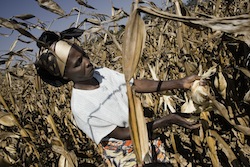Earlier this month, the U.N. Committee on World Food Security (CFS) has released a draft study on biofuels and food security with a public comment period until January 30, 2013. Yesterday, the Renewable Fuels Association (RFA) submitted comments about the report and its several policy recommendations.
 The authors write, “Our report has confirmed the central role of biofuels in provoking high and volatile food prices, and therefore, we point to the fact that there is enough evidence to call in question the use of mandates/targets together with subsidies and tariffs where these artificially stimulate biofuels production. Our Report concludes, however that in the context of persistent high oil prices, biofuels from maize in the US and from sugar-cane in Brazil can be, for different reasons, market competitive. In this situation, we must advance beyond the discussion of mandates and subsidies to include mechanisms for controlling the growth of biofuels markets. The recent EU Directive has moved in this direction, and while the EPA in the US has rejected the suspension of targets, maize/ethanol has almost reached its current allocated share of the biofuels market. Policies should now be directed at ensuring that domestic ceilings are not made innocuous by the emergence of a global biofuels market.”
The authors write, “Our report has confirmed the central role of biofuels in provoking high and volatile food prices, and therefore, we point to the fact that there is enough evidence to call in question the use of mandates/targets together with subsidies and tariffs where these artificially stimulate biofuels production. Our Report concludes, however that in the context of persistent high oil prices, biofuels from maize in the US and from sugar-cane in Brazil can be, for different reasons, market competitive. In this situation, we must advance beyond the discussion of mandates and subsidies to include mechanisms for controlling the growth of biofuels markets. The recent EU Directive has moved in this direction, and while the EPA in the US has rejected the suspension of targets, maize/ethanol has almost reached its current allocated share of the biofuels market. Policies should now be directed at ensuring that domestic ceilings are not made innocuous by the emergence of a global biofuels market.”
Geoff Cooper, RFA’s Vice President for Research and Analysis, explained that the draft report “needs substantial revision before it can be submitted for official peer review. Not only does the report fail to discuss potentially positive impacts of biofuels expansion on food security, but it also inappropriately expands the intended scope of the study, blatantly disregards input from the May 2012 consultation, fails to include a comprehensive literature review, and adopts highly questionable assumptions regarding animal feed co-products, crop yields and other factors.”
The RFA comments reflect the association’s belief that “biofuels are providing tangible benefits and positive outcomes for both the world’s farmers and consumers. Biofuels have already proven themselves as agents of economic development, environmental improvement, and social progress in many developed nations. We believe biofuels can bring the same benefits to developing nations without jeopardizing food security. In fact, biofuels have the potential to serve as an important tool in reducing food insecurity. Indeed, we agree with the U.N. Food & Agriculture Organization (FAO) that: ‘…investment in bioenergy could spark much-needed investment in agricultural and transport infrastructure in rural areas and, by creating jobs and boosting household incomes, could alleviate poverty and food [in]security.’”
You can read RFA comments in full here.

